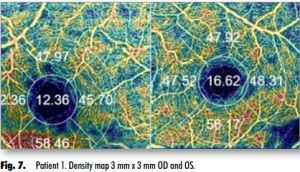PRACA ORYGINALNA
Optical Coherence Tomography Angiography in the Evaluation of Macular Retinal Microvasculature in Patients in the Early Clinical Stage of Alzheimer’s Disease – A Preliminary Report
1
Medical Research Center BRAND MED
2
Dementia Diseases Unit Mossakowski Medical Research Institute, Polish Academy of Sciences
3
Department of Ophthalmology, Medical University of Warsaw
4
Department of Neurology, National Medical Institute of the Ministry of the Interior and Administration, Warsaw
5
National Medical Institute of the MSWiA, Department of Digital Medicine and Innovation
Data nadesłania: 20-11-2023
Data akceptacji: 21-12-2023
Data publikacji: 29-12-2023
Ophthalmology 2023;(4):1-7
SŁOWA KLUCZOWE
Alzheimer’s disease (AD)mild cognitive impairmentoptical coherence tomography angiography (OCT-A)retinaretinal microvasculaturevessel density
STRESZCZENIE
Introduction: Alzheimer’s disease (AD) is a chronic neurodegenerative condition causing cognitive decline among elderly individuals. In addition to neurological deficits, a key role in the onset and subsequent progression of AD Alzheimer’s disease-specific changes is attributed to vascular factors. Retinal microvasculature and cerebral small vessels share similar anatomical features and physiological characteristics, and damage to the retinal vascular bed can be observed at any stage of AD Alzheimer’s disease. Retinal microvasculature can be visualized and assessed non-invasively using the technique of optical coherence tomography angiography (OCT-A). Aim of study: Evaluation of macular retinal microvasculature in the superficial capillary plexus based on OCT-A optical coherence tomography angiography images in patients diagnosed with the mild stage of Alzheimer’s dementia. Material and methods: The study involved a total of 21 patients diagnosed with mild Alzheimer’s dementia confirmed by neuropsychological tests and neuroimaging studies. optical coherence tomography angiography OCT-A was used to determine vessel density in the superficial retinal capillary plexus (SRCP), i.e. generate a density map within five-field ETDRS circles with diameters of 3 mm and 6 mm. Results: Alterations in the macular retinal capillary network were noted in all eyes studied. In the majority of eyes, there was a marked reduction in vessel density reflected in the quantitative metrics in the density map around the FAZ in at least one of the scans obtained for a given eye (3 mm x 3 mm and/ or 6 mm x 6 mm) and in the macroscopic evaluation of the superficial and deep capillary plexuses, capillary thinning, and irregular area/mexpansion of the FAZ. Conclusions: Optical coherence tomography angiography OCT-A has the potential to serve as a valuable tool for screening or monitoring the response to therapies in patients with Alzheimer’s disease AD. However, further research is necessary to standardize study methodologies and determine whether impaired retinal microvasculature in patients with Alzheimer-type MCI or preclinical Alzheimer’s disease AD correlates with the advancement of cognitive decline and loss of neurons and cerebral blood vessels in individual Alzheimer’s disease AD patients and, hence, has clinical utility.
Udostępnij
ARTYKUŁ POWIĄZANY
Przetwarzamy dane osobowe zbierane podczas odwiedzania serwisu. Realizacja funkcji pozyskiwania informacji o użytkownikach i ich zachowaniu odbywa się poprzez dobrowolnie wprowadzone w formularzach informacje oraz zapisywanie w urządzeniach końcowych plików cookies (tzw. ciasteczka). Dane, w tym pliki cookies, wykorzystywane są w celu realizacji usług, zapewnienia wygodnego korzystania ze strony oraz w celu monitorowania ruchu zgodnie z Polityką prywatności. Dane są także zbierane i przetwarzane przez narzędzie Google Analytics (więcej).
Możesz zmienić ustawienia cookies w swojej przeglądarce. Ograniczenie stosowania plików cookies w konfiguracji przeglądarki może wpłynąć na niektóre funkcjonalności dostępne na stronie.
Możesz zmienić ustawienia cookies w swojej przeglądarce. Ograniczenie stosowania plików cookies w konfiguracji przeglądarki może wpłynąć na niektóre funkcjonalności dostępne na stronie.




